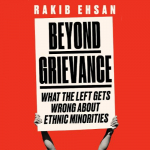Against Decolonisation
Jim Butcher reviews Against Decolonisation: Taking African Agency Seriously by Olúfẹ́mi Táíwò. This review was first published by Cieo, which publishes original essays, reports and analysis designed to celebrate humanity’s potential.
We do not expect to see a book with Against Decolonisation in the title. Being against decolonisation suggests that colonial powers should have held onto the countries in their possession, a position which has, rightly, become politically and morally untenable. On the contrary, ‘decolonise’ is now an official value in universities and beyond; affirmed in ‘anti-racist reading lists’, staff training sessions and curriculum design. It is not up for debate. But in Against Decolonisation: Taking African Agency Seriously, Olúfẹ́mi Táíwò asks readers to engage in precisely this debate by considering the true meaning and impact of today’s decolonise movement.
Táíwò distinguishes between ‘decolonisation 1’, the perspective of opponents of colonialism in the past, and ‘decolonisation 2’, a very different set of ideas and assumptions. He argues that today’s decolonisers do not promote social justice for Africans but actually reprise a theme familiar from rationalisations of colonialism itself: that Africans and their societies lack the agency to choose and make their own future. This is a hard-hitting claim which goes against the mainstream critical social justice advocacy often espoused in universities in Africa and beyond.
For Táíwò, ‘decolonisation 2’, involves:
forcing an ex-colony to forswear, on pain of being forever under the yolk of colonialism, any and every cultural, political, intellectual, social and linguistic artefact, idea, process, institution and practice that retains even the slightest whiff of the colonial past.
Its proponents blur decolonisation with a more recently developed and far more specific decoloniality. Táíwò cites the anthropologist Arjun Appadurai who defines decoloniality as being,
‘rooted in indigenous thought and practice about nature, community, and solidarity’, resting on ‘a reversal of the historical impact of capitalism and colonialism’, seeking ‘to return us to an earlier period of precolonial splendor’.
According to this way of thinking, a pervasive colonial legacy shapes the present. But, Táíwò argues, there is no contradiction between recognising the brutality and oppression of colonialism and that we now live in a post-colonial world where values considered ‘western’ can have a universal validity.
Western philosophy in the frame
Táíwò notes that today’s decolonial thinkers consider ‘western’ philosophical traditions to be not just alien to Africans but complicit in their subjugation. He defends philosophy labelled ‘western’ as being as much the property of Africans as that of Europeans or anyone else:
As 18th century philosopher David Hume and Immanuel Kant were libelling African descended peoples, their contemporaries James Beattie and Olaudah Equiano, and James Africanus Beale Horton a few decades later, were rebutting their arguments within the same epistemic, metaphysical and ethical frameworks – a development that made the latter two African-descended thinkers co-owners of western philosophy!
Western philosophy and African philosophy, however defined, are philosophy, and philosophical ideas are not inscribed upon anyone as an accident of birth or nationality. New ideas – those of Hume and Kant, for example – emerge from the shadows of pre-existing prejudices. Táíwò sees the prejudices and their sometimes-brutal consequences, but also the potential in western Enlightenment philosophy to put human freedom, equality and development at the centre of social and political life.
Many of today’s ‘decolonize 2’ thinkers seek authority for their views by projecting them back onto ‘decolonize 1’ figures of the past. So, for example, anti-colonial radical Frantz Fanon’s The Wretched of the Earth (1961) is often considered as a founding text of the decolonial tradition. But this involves a very particular reading of Fanon, who argued that a post-colonial future would not be framed by a defeated colonialism. Táíwò argues that Fanon is at least as much of a humanist as he is a decolonial thinker. He argues that Fanon and other anti-colonial icons such as the pan-Africanist revolutionary Amílcar Cabral, write their ‘j’accuse’ from within Western philosophy. Both embraced ‘the politico-philosophical discourse of modernity which accused colonialism both of baiting the colonised with its promise and of switching when the time came to deliver on it.’
In fact, throughout the history of colonialism, its opponents adopted ideas associated with the Enlightenment, and turned them against the western colonisers who denied their universal applicability on racial grounds. History is littered with campaigners, thinkers, political movements and constitutions of newly sovereign post-colonial states that take ‘western’ thought as their inspiration for liberation.
Modernity as a problem
Crucially, for the proponents of ‘decolonise 2’, colonialism was a product of capitalist modernity. As a result, modernity has come to be seen as a problem, not a solution, for African societies. Again, this marks a reversal of the view held by anti-colonial writers from a previous era for whom modernity – economic development, access to scientific knowledge, democracy – was a positive goal and something colonialism had denied them.
Táíwò goes so far as to argue that ‘perhaps the most pernicious wall erected by decolonisers is the truncating of the history of Africa’s rich and long engagement with modernity’. Modern ideas of progress and development, of rights and liberal democracy, are typically prefixed with ‘western’, ‘European’, or even ‘white’ by decolonial advocates today. In this way, modernity is placed at odds with African tradition and culture and presented as part of an alien colonial imposition from the west that lives on post-independence.
Táíwò does not deny a relationship between capitalism, modernity and colonialism. But he argues that it is wrong to elide them in the way contemporary decolonial thinkers are prone to do. So he accepts that colonialism was bound up with the desire to expand the imperial and economic power of western capitalist nations, and also that that philosophies emphasising freedom, sovereignty and development were espoused by those who kept Africa unfree, oppressed and poor through colonial domination. But he also contends that colonialism blocked the development of an indigenous capitalist class throughout Africa, and stymied the economic development associated with modernity. Further, the racial thinking associated with colonialism legitimised a denial of ‘western’ democratic rights and freedoms. Anti-colonial movements demanded precisely what the west had but denied to its colonial subjects: political and economic modernity.
Much decolonial thought frames reason, rationality and individualism as features of ‘western’ modernity. African societies, on the other hand, are defined by traditional knowledge, indigenous languages and quite different cultural assumptions. Following this line of argument, Africans – in order to be authentically African – should exclude themselves from modernity and the values accompanying it, and follow different, ‘African’, paths. This mode of thinking uses the radical language of anti-colonialism in order to circumscribe political and cultural choices for Africans.
Táíwò is scathing of the idea that different people think differently and inhabit different worlds of thought and ideas. He sees this view as embracing the ‘racialisation of consciousness’. It reifies colonialism’s denial of African agency, only in radical-sounding anti-colonial language. Táíwò states that this: ‘reaffirms the racist ideology that Africans are permanent children. I want no part of it’.
Sociocrynomics
The rejection of modernity by ‘decolonisation 2’ leads to what Táíwò terms ‘sociocrynomics’. Sociocrynomics equates cultural resistance to ‘western ideas’ with establishing an authentic identity for oneself or with resisting oppression. It refers to the preservation of social forms irrespective of whether those to whom they belong wish to preserve, modify or eradicate them. Sociocrynomics, he argues, leads to the embrace of reactionary institutions in the name of a radical sounding demand to decolonise. Many in Africa see promise in modernity. Many of the leaders of sovereign post-colonial regimes had high hopes for development and aspired to catch up with richer nations. The sociocrynomic tendency in today’s decolonial thought effectively tells them they were wrong, or misguided, to do so.
Demands to widen access to the benefits of modern societies could, and should, be at the heart of any movement claiming the epithet ‘social justice’ or ‘equality’. These benefits would include the latest and best scientific breakthroughs, industrialisation on a grand scale to meet people’s needs and wants, and infrastructural development to link Africa to the world in order to enhance trade and wealth. These sorts of aspirations prevailed in ‘decolonisation 1’, but are seldom heard, and often actively opposed, in ‘decolonisation 2’.
Decolonise 2’s colonial assumptions
Táíwò argues that the criticisms of modern society as colonial are not just flawed but carry assumptions comparable to those associated with colonialism itself. According to this way of thinking, the political agency of Africans is either circumscribed or pathologized:
To see today’s race poetics through the prism of decolonize involves viewing sovereign African states, and their populations, as incapable of choosing ‘western’ development standards, rights or liberal democracy. It posits those who do as somehow not truly authentic to their African identities, as complicit in an ongoing colonial mindset.
So, perversely, the contemporary decolonial movement’s rejection of universalism mirrors, rather than opposes, colonialism. Táíwò cites the Ghanaian political philosopher Ato Sekyi-Out:
to abjure universalism tout court because of imperialism, Eurocentric and discriminatory auspices of certain versions – as some conscripts to the western anti-imperialist cause in common with certain voices from the global south invite us to do – is the last word of the imperial act.
Táíwò is not prepared to ditch universalism or modernity in politics just because colonial powers falsely laid claim to it as their own. He makes the same case for art and cites Nigerian composer and musician Fela Sowande in support of this view: ‘We are not prepared to submit to the doctrine of apartheid in art by which a musician is expected to work only within the limits of his traditional form of music.’ The universal potential in art and ideas is something Táíwò holds dear.
The importance of language
Táíwò’s take on the cultural legacy of colonialism avoids the one-sidedness of most other contemporary discussions. He does not dismiss the importance of, for example, African languages supressed by colonisers as expressions of African thought and tradition. The learning and utilisation of these languages can be a part of understanding the past, capturing African culture and understanding it at a deeper level. But he questions the failure of some decolonial advocates to consider the universal character of culture and language. It should not be seen as a contradiction to see value in indigenous languages and, at the same time, see Portuguese as an ‘African’ language:
By its very nature, no language can be owned by any person or any people. Anyone who is willing and able to acquire a language becomes part owner of that language. Even when enslaved persons were forbidden from learning to read and write, their common capacity to acquire language by ear – which the slave owner could not take away from them – allowed them to become proficient in the shared language and turn it to devastating use in calling their owners out on their hypocrisy, inconsistency, illogicality and their unspeakable cruelty, especially when they claimed to be pious Christians.
Out of Africa
In seeking an engagement between ‘decolonise 1’ and ‘decolonise 2’, Táíwò hopes to prompt a debate. This is badly needed outside of Africa too, but the bureaucratic affirmation of decolonise campaigns in parts of western academia mitigates against exactly the sort of dialogue that Táíwò seeks in the African context. Ascribing ideas to identities – ‘white’, ‘black’, ‘African’, ‘western’, ‘southern’ – without recognising that all these ideas are the property of all of us – leads to a circumscribed dialogue. Calls to ‘Stay in your lane!’ or the blind insistence that ‘It’s policy!’ replace meaningful exchanges. Táíwò notes that decolonization can become ‘a catchall trope, often used to perform contemporary ‘morality’ or ‘authenticity’’.
For this reason, Against Decolonisation is unlikely to feature on the anti-racist reading lists issued by many western universities. Instead, we have ‘decolonise the curriculum’ campaigns and staff training in race and decolonise (note training in, as opposed to discussion of) that leaves little room for opposing views. Yet those who take issue with Táíwò’s critique should, at very least, take up the gauntlet thrown down in Against Decolonisation. Failure to do so treats decolonisation as an unquestioned moral norm rather than a particular philosophical and political standpoint to be considered, reducing it to what JS Mill referred to as a ‘dead dogma’. This fails to serve the wider purpose of our universities, both in Africa and in the west.
Today, in the former colonial heartlands, the descendants of people from Europe’s colonies may face racism, but they are also integrated into cultural and economic life. Modernity is theirs, the languages they speak – English, Portuguese, French – are their own. Their rights are shared in common with others in their societies and most of their struggles are shared with their white peers. Racism exists, but has declined greatly, and does not define all aspects of life. Privilege, or its lack, is generally much more a product of class and wealth than race. Yet decolonial theorists in the universities persist in viewing the colonial past as key to contemporary struggles, reproducing exactly the same limiting assumptions within the UK as Táíwò identifies in relation to Africa.
In the spirit of Táíwò’s universalism, Against Decolonisation is a book about Africa which is also a discussion about our shared world. All who take African agency seriously should read it.
Against Decolonisation: Taking African Agency Seriously by Olúfẹ́mi Táíwò is published by Hurst and is available to purchase here.
Jim Butcher is a lecturer at Canterbury Christ Church University.


